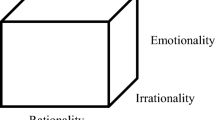Abstract
Preferences and uncertainty occur in many real-life problems. We are concerned with the coexistence of preference and uncertainty in the same problem. In particular, we consider uncertainty, defined by the theory of possibility [2], that is one non-probabilistic way of dealing with uncertainty, that comes from lack of data or imprecise knowledge.
We propose a method to integrate fuzzy preferences and uncertainty [3], which follows the approach in [2] and allows one to handle uncertainty within a fuzzy optimization engine, which at the same time observing separately the preference and the robustness of complete instantiations. To order the complete instantiations, we define three semantics, which correspond to the attitude to the risk.
We generalize this method in [4] to deal also with other classes of preferences such as probabilistic or weighted constraints [1], and also probabilistic uncertainty. In particular, probabilistic constraints are very useful for modelling real-life scenarios where fuzzy constraints are not the ideal setting, because combining preferences multiplying them is better than taking their minimum value. Weighted constraints are useful to model problems where preferences are penalties (or costs) to be added, and where the best preferences are the smallest ones.
Similar content being viewed by others
References
Bistarelli, S., Montanari, U., Rossi, F.: Semiring-based Constraint Solving and Optimization. Journal of the ACM 44(2) (March 1997)
Dubois, D., Fargier, H., Prade, H.: Possibility theory in constraint satisfaction problems: handling priority, preference and uncertainty. Applied Intelligence 6, 287–309 (1996)
Pini, M.S., Rossi, F., Venable, B.: Possibility theory for reasoning about uncertain soft constraints. In: Godo, L. (ed.) ECSQARU 2005. LNCS (LNAI), vol. 3571, pp. 800–811. Springer, Heidelberg (2005)
Pini, M.S., Rossi, F., Venable, B.: Possibilistic and probabilistic uncertainty in soft constraints problems. In: Proc. of the IJCAI 2005 Multidisciplinary Workshop on Advances in Preference Handling, Edinburgh (July 2005)
Author information
Authors and Affiliations
Editor information
Editors and Affiliations
Rights and permissions
Copyright information
© 2005 Springer-Verlag Berlin Heidelberg
About this paper
Cite this paper
Pini, M.S., Rossi, F. (2005). Uncertainty in Soft Constraint Problems. In: van Beek, P. (eds) Principles and Practice of Constraint Programming - CP 2005. CP 2005. Lecture Notes in Computer Science, vol 3709. Springer, Berlin, Heidelberg. https://doi.org/10.1007/11564751_103
Download citation
DOI: https://doi.org/10.1007/11564751_103
Publisher Name: Springer, Berlin, Heidelberg
Print ISBN: 978-3-540-29238-8
Online ISBN: 978-3-540-32050-0
eBook Packages: Computer ScienceComputer Science (R0)




